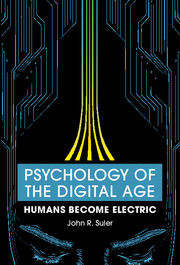Book contents
- Frontmatter
- Dedication
- Contents
- List of Figures
- Foreword
- Preface
- Acknowledgments
- Introduction: Newborns in Evolution
- 1 Cyberpsychology Architecture
- 2 Presence: Be Here Now
- 3 The Dynamic Digital Psyche
- 4 The Disinhibited Self
- 5 Electrified Relationships
- 6 Other Than You Think: Interpersonal Perceptions
- 7 Text Talk
- 8 Image Talk
- 9 I, Avatar
- 10 One of Us: Groups and Communities
- 11 Change and Excess
- 12 Addicted or Devoted
- 13 The Digital Deviant
- 14 Synthesized Realities and Synthesized Beings
- 15 Electric Th erapeutics
- Conclusion: Research and the Researcher
- References
- Index
10 - One of Us: Groups and Communities
Published online by Cambridge University Press: 05 November 2015
- Frontmatter
- Dedication
- Contents
- List of Figures
- Foreword
- Preface
- Acknowledgments
- Introduction: Newborns in Evolution
- 1 Cyberpsychology Architecture
- 2 Presence: Be Here Now
- 3 The Dynamic Digital Psyche
- 4 The Disinhibited Self
- 5 Electrified Relationships
- 6 Other Than You Think: Interpersonal Perceptions
- 7 Text Talk
- 8 Image Talk
- 9 I, Avatar
- 10 One of Us: Groups and Communities
- 11 Change and Excess
- 12 Addicted or Devoted
- 13 The Digital Deviant
- 14 Synthesized Realities and Synthesized Beings
- 15 Electric Th erapeutics
- Conclusion: Research and the Researcher
- References
- Index
Summary
Those who do not remember the past are condemned to repeat it.
– George SantayanaWhen jbum, the creator of Palace, asked me whether I wanted to be a wizard, I was delighted. I remember my heart beating faster and feeling flushed. Of course, I said yes. Even though happy simply being a member of Palace as well as a researcher studying the community, I secretly hoped I might join the wizard ranks. He told me that I would be initiated and when. I was quite excited that day as I waited for the appointed hour to meet jbum at the Main Mansion. I went to the café as instructed, but was totally confused to find it empty. Where was everyone? Then Spingo came in and told me to utter an incantation that magically transported me to a room I didn't know existed. It was a hidden room, Murmoorerer, a copy of the moor. All of the other wizards were there. My whole family crowded around the computer to watch. I was so nervous that I could barely type. Because of the top-secret nature of the wizard induction ceremony, I cannot divulge what occurred. Needless to say it was thrilling and hysterically funny.
Big groups, little groups, family groups, workgroups, peer groups, hobbyist groups, political groups, sex groups, and all varieties of special interest groups – cyberspace is chock full of them. In fact, the potential for creating online groups is orders of magnitude beyond anything we have ever seen in the physical world. It is an important feature of how cyberspace accelerates social phenomena. This fact captures our attention and concern because groups are powerful forces. Beginning with such books as Rheingold's The Virtual Community (1993), researchers have described how gatherings of people in cyberspace take on the look and feel of groups in the real world. Being more skeptical, as suggested by the title of Weinberger's Small Pieces Loosely Joined (2008), we might wonder whether a truly cohesive, purposeful “community” in cyberspace is more of an illusion than a reality. In this chapter, I address that question by taking you on a journey through the online groups my students and I have studied during two decades of participant-observation field research, pointing out the lessons we learned along the way.
- Type
- Chapter
- Information
- Psychology of the Digital AgeHumans Become Electric, pp. 254 - 280Publisher: Cambridge University PressPrint publication year: 2015



